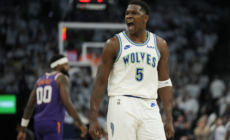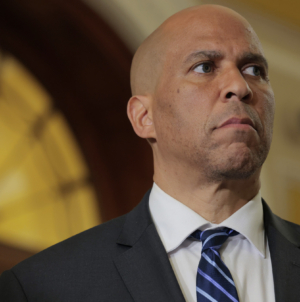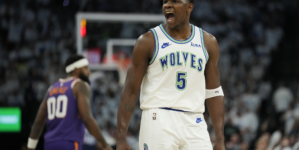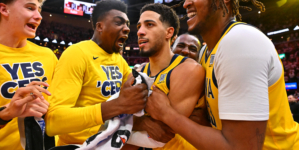-
MAGA Accuses Democratic Senator Cory Booker of Doing ‘Nazi Salute’ - 11 mins ago
-
Multiple officers down in Baldwin Park - 20 mins ago
-
‘TACO’ Is the Secret to Trump’s Resilience - 34 mins ago
-
Timberwolves’ Anthony Edwards Draws Epic Comparison to Dwyane Wade - 46 mins ago
-
Trump to Withdraw Musk’s Ally as Nominee for Top NASA Job - about 1 hour ago
-
How to Buy Indiana Pacers NBA Finals Merchandise: Conference Champions Hats, T-Shirts, Gear - about 1 hour ago
-
Rihanna’s Father Dies, Barbadian PM Says: ‘Spirit of Our Nation’ - 2 hours ago
-
M.I.T. Class President Barred From Graduation Ceremony After Pro-Palestinian Speech - 2 hours ago
-
Wayfarers Chapel may have a new site in Rancho Palos Verdes - 2 hours ago
-
Bulls Must Make Major Decision on Josh Giddey Contract - 3 hours ago
Kelsey Grammer Remembers Late Sister: ‘The Grief Was So Enormous’

John Russo
“The grief was so enormous. I don’t blame anybody for grieving to that extent, I get it.”
Shortly before Kelsey Grammer rose to fame playing Dr. Frasier Crane on Cheers and then Frasier, he experienced a horrible personal tragedy: His 18-year-old older sister Karen was brutally murdered in 1975. “The grief was so enormous. I don’t blame anybody for grieving to that extent, I get it.” And now he’s memorializing Karen’s memory—and searching for answers—in Karen: A Brother Remembers (May 6). He says the book “came from what is a shared sadness, a depth of sadness that we have to go through these things,” and hopes that others will feel a “lifeline” with this book. “There is a personal, human cost struggle that is forever. From the moment that happens, it’s forever. So I think that one of the goals of the book would be to actually extend the hand of love to everybody that’s felt the same way, who will spend the rest of their lives remarking on it.” While the “grief is always there,” Grammer says writing this book “let the grief roll back just enough to be able to remember her story is my story, and that our love that we had is forever, and that’s been great.”
SUBSCRIBE TO THE PARTING SHOT WITH H. ALAN SCOTT
ON APPLE PODCASTS OR SPOTIFY AND WATCH ON YOUTUBE
Editor’s Note: This conversation has been edited and condensed for publication.
This book is so emotional. Are you prepared for the emotional response people will have after reading this book?
I don’t know if I was prepared, but I’m actually very happy that the response has been emotional, because it came from emotion. It came from what is a shared sadness, a depth of sadness, that we have to go through these things, or that our loved ones are hurt in such a way. And I know that it’s happened to a lot of other people, and I know that when they are faced with just the unspeakable tragedy like Karen’s or like so many other people that are in our headlines, even today, there is a personal, human cost struggle that is forever. From the moment that happens, it’s forever. And so I did think that one of the goals of the book would be to actually extend the hand of love to everybody that’s felt the same way, who will spend the rest of their lives remarking on it, who will relive it. It’ll come up again and again and again, as it does for me.
When I was talking to Esther [a personal medium] and she said, your sister wants you to tell her story, I didn’t know I was going to write a book, but as I started to write down what I thought were points of interest about Karen and why I was going to go on this journey, I suddenly realized, “Oh, I’m supposed to write a book.” And it came that way. It just was an extraordinary mission, and it took me three years to do it, and it was a religious experience. I did decide I was just going to be completely open in the book, so that all the things that happened contemporaneously within it—when I say, I took a few weeks off, I had to take a few weeks off—I did. I decided I couldn’t figure this out, or I went to bed last night dreading what I was going to try to write the next day. There are things like that that’s just all true. So there’s an uninterrupted flow of the book as it came to life that is inherent in the invitation to read it as well.
You’re welcome on this journey with me. Come and take it with me. If this helps you, I’m delighted. It’s helped me. The gift that I hope to give people is that they would have an insight like you said, “Oh, I knew about that with him,” but now you know a different way and the way I walked in it, and the way I invite people to walk hand-in-hand with me on it, and I want everybody to come along. I really do. I want millions of people to read it. I want them to know what it’s like to love somebody that much in a way that they will know in the living and breathing of her life, they’ll share in some of her moments. That, to me, became really important. When Esther said “Tell your sister’s story,” I think Karen was saying, “This is going to help you a lot.”
How did things change for you after this tragedy?
Without knowing it some of the time, it did catalyze my motion into a series of choices that were absolute choices, they were never halfway choices, I didn’t make halfway choices after Karen was killed. I made full-on, “I’m willing to blow it all here. I’m willing to lose everything I’ve ever had, because that’s the only thing that’s important” [choices]. And it came up again in that silly passage where I’m talking about watching Sing 2. That sudden image of, well, if it’s not worth everything, it’s not worth anything. If it’s not the most important thing you can think of, don’t do it. So there are no halfways. You’re not allowed to have a halfway if you understand that the ticking clock, the race in life, it can be taken from you in a heartbeat. Anybody can walk up and destroy your life. So you have to be fierce in the game. And then, of course, I stepped away from it a lot in my life, and some of my indulgences and escapism. But it was always there in the background saying, “Get up. You’re wasting your time.” So that you know that when people often ask, “How is it?” You got to a place where then suddenly there was a drumbeat, always of, “You have to get up and go. You still have a job to do.” That never went away, and I can always still hear it. Sometimes I didn’t want to hear it.
Shortly after this tragedy, your career really skyrocketed. Was there a motivation to perhaps distract yourself from processing this tragedy as a young actor?
It’s interesting. Something I figured out along the way, in terms of the work, was always that if it’s really good writing, and you’re doing a good job that day, all the stuff that is in you will come along for the ride. And so often, without trying to find a way for Karen to be explored and seen, boom, there it was. It just happened.
Was there ever a moment where you felt survivor’s guilt, particularly because of your spectacular success?
Yeah, it certainly was an aspect of my life. Certainly. It almost trivializes it, to be able to just coin the phrase that matches it, but that’s what it was. Why am I here? Why did this happen? This series of things happened to people I loved and didn’t happen to me. So yeah, I did go through that.
And I didn’t quite answer your previous question about the work. I love to work. The reason I keep working is because I love to work. I make excuses like, “Well, I had another kid this year, so I gotta keep working for another 10 years.” [laughs] But all of that’s life. I love life, and my life is my work and my life is my family, and my family is my life. These all feed into each other, and I’m not going anywhere. I’m never going to retire. I mean, why the hell would anybody retire? I don’t understand it.

Courtesy of Harper Select, an imprint of HarperCollins Focus
What I found so compelling about the book is that it started with a search for answers, but became a testament to the memory of Karen.
Yeah, in the end, the final answer is memorializing her life is the only thing that really is of value to resolve some of the questions I always had to finally put together the night when her life was taken, to really understand what took place there. And there are still some holes because they never found her glasses, for instance. Karen couldn’t see without them. So I don’t know what he did with them or whatever, but there was so much resolution that came. That police report was very important to me, when I when I read it, and I read every page of it. It was gut-wrenching and horrifying and devastating at times, but it was also the key. I found Karen’s boyfriend [John] through it, who, remarkably, was a casting director in Hollywood. And John, we’re friends now. It’s really remarkable. The mission was to tell her story, and I think I did that. I think I told Karen’s story, and it’s mine intertwined with hers, because our youth together was important. She was such a great kid. Nobody deserved to die that way. I remember this line from Absence of Malice. [Paul Newman’s character] at one point says, “Did you like her? Couldn’t you see she was suffering? Couldn’t you see that?” I heard that line in that movie, I just was like, I wonder if this guy even thought about [her]. That was something that haunted me and will probably forever. But he’s not interested in anything about that.
In writing this book, was there anything that surprised you?
The truth is, there weren’t any real surprises. There was only the refreshing sort of waking surprise every time I’d start writing, of rediscovering how close we were, of how she was still there in me, everywhere and almost all the time, and how I had carried her because it was a truly great love. I do apologize at one point for the times when I wasn’t thinking about her, but that’s a little silly. It’s not silly, it just felt like that. But she was just a presence in my life, and the grief was so enormous. I don’t blame anybody for grieving to that extent, I get it. And I wanted to say it’s okay, and maybe offer them a lifeline, and say, we can swim over here, and maybe there’s a little bit of peace you can find. And we’ll have a toast to our loved ones.
I have to say, in reading this book, it does feel like you’ve given her to us, in some way honored her life.
She’s part of us again. The grief thing is always there. Now I understand why it’s more important to remember her life than to still play in the grieving. But the grieving kept her alive in a lot of ways, too. It kept my anger alive. It was just a matter of time till finally, I got this message that said, tell my story, and that let the grief roll back just enough to be able to remember her story is my story, and that our life and our love that we had is forever, and that’s been great.
I do have to acknowledge that character of Frasier, both on Cheers and Frasier, continues to be such a special part of culture. Special in a way that allows us a distraction from a sometimes complicated world.
Well, that’s lovely. It’s a magnificent feeling, because it is something you can point to and know you did the world some good, and that’s fantastic. And that experience is what I wanted to give Karen, just enough for her to be able to really enjoy it, too.




















